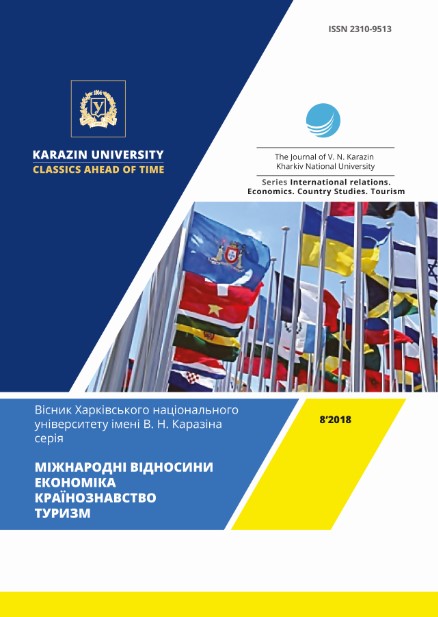Geography of world water consumption: state, dynamics, prospects
Abstract
The lack of fresh water is becoming the one of the most threatening challenges to mankind. It is pertinent to solve the problem of finding ways to overcome the impending danger. The features of the allocation of water resources and their use in the modern world are considered. Based on correlation analysis it is shown a relatively high correlation between the population and water resources, on the one hand, and volumes of water consumption, on the other, in the context of different world parts, and the absence of such correlation in the context of individual countries of the world. It describes the state and dynamics of world industrial, communal and domestic water consumption. There are calculations on the forecast of the state of water resources, taking into account the increasing volume of their exploitation, irrevocable water losses and pollution of water sources. It shows that the dynamics of their use leads to a threatening water management imbalance on a global scale. The measures taken toupgrade the water supply systems for population and economy will not lead to an improvement of the situation. It is necessary to find ways of solving the problem on the international level, including organizational, political, economic, and technical aspects. One of such ways is to improve the water consumption territorial structure on a planetary scale based on the strengthening importance of the water factor in the organization of industrial and, in particular, agricultural production. Conclusions: the water factor should become decisive in determining the economic specialization of countries within the framework of the international division of labor. The second way includes the extension of the practice of inter-basin redistribution of river flow with the creation of interregional and international zones of unified water consumption with the appropriate water management complexes.
Downloads
References
Алексеевский Н.И., Гладкевич Г.И. Водные ресурсы в мире и в России за 100 лет. [Электронный ресурс]. — Режим доступа:// www.eco-mnepu.narod.ru/book/2003-5.htm
Бабенко В.А., Алисейко Е.В. Эффективное использование информационных ресурсов системы поддержки принятия решений в сфере природопользования // Серія "Економіка АПК і природокористування". – Вісник ХНАУ, 2008. – №3. – С.120-129.
География мирового развития. Выпуск 2: Сборник научных трудов/ Под ред. Л.М. Синцерова. – М.: Товарищество научных изданий КМК, 2010. – 496 с.
Запасы воды в мире. Список стран по водным ресурсам. [Электронный ресурс]. – Режим доступа: http://www.statdata.ru/zapasi-vody-v-mire
Лихачева А. Вода и мир. [Электронный ресурс]. — Режим доступа: http://www.globalaffairs.ru/number/Voda-i-mir-18239
Максаковский В.П. Географическая картина мира. Кн. 1. – М.: Дрофа, 2008. – 405 с
Мировое водопотребление. [Электронный ресурс]. – Режим доступа: http://www.microarticles.ru/article/vodnie-resyrsi-mira.html
Потребление воды в мире. [Электронный ресурс]. — Режим доступа: http://www.priroda.su/item/1323
Современное состояние орошаемого земледелия в мировой практике. Калашников А.А., к.т.н., Жарков В.А., к.т.н.; Калашникова Л.П., Ангольд Е.В. Казахский научно-исследовательский институт водного хозяйства. http://www.rusnauka.com/26_WP_2012/Agricole/3_116187.doc.htm
Authors who publish with this journal agree to the following terms:
- Authors retain copyright and grant the journal right of first publication of this work under the terms of a license Creative Commons Attribution License 4.0 International (CC BY 4.0).
- Authors are able to enter into separate, additional contractual arrangements for the non-exclusive distribution of the journal's published version of the work (e.g., post it to an institutional repository or publish it in a book), with an acknowledgement of its initial publication in this journal.
- Authors are permitted and encouraged to post their work online (e.g., in institutional repositories or on their website) prior to and during the submission process, as it can lead to productive exchanges, as well as earlier and greater citation of published work.




